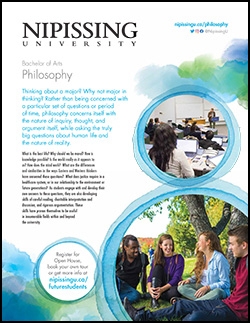Welcome to Philosophy at Nipissing
Thinking about a Major? Why not Major in Thinking? Rather than being concerned with a particular set of questions or a particular period of time, philosophy concerns itself with the nature of inquiry, thought, and argument itself, asking how each of these operates in the various areas of human life, from ethics and politics to the study of nature and reality. This means that philosophy students take up the truly big questions: What is the best life? Why should we be moral? How is knowledge possible? Is the world really as it appears to us? How does the mind work? At the same time, the skills students develop in pursuit of a degree in philosophy – careful reading, charitable interpretation and discussion, and rigorous argumentation – have proven themselves to be useful in innumerable fields within and beyond the university.
The Philosophy Program at Nipissing is small and student-focused: with an average of 35 full-time majors, students get to know and work closely with both their professors and their peers. The department is particularly committed to introducing students to the history of philosophy, from the ancient period to the present. The program is designed to work well either as a stand-alone degree or as a combined degree with other programs, and there are numerous philosophy courses offered each year that do not have prerequisites and that are popular electives for students in other programs.
Philosophy at Nipissing University
Some especially popular courses include:
PHIL 1116: Introduction to Western Philosophy
Students are introduced to the main concerns in the discipline of Philosophy within the Western tradition. Beginning with the ancient Greeks and ending with the 20th century, students explore some of the most significant issues that have engaged philosophers during each of the main periods of the long and complicated history of Western Philosophy.
PHIL 1117: Values and the Human Condition
Students are introduced to some of the most important themes in the theory of value. While the specific topics and texts will vary each year, students can expect to critically explore fundamental questions about what it means to be a human being, the significance of human diversity, and the role of values in human life.
PHIL 2507: Bullshit, Bias, and Propaganda: Reasoning about the Irrational
Students explore historical and contemporary work in social epistemology, including the nature and limits of public reason, forms of bias in human thinking, and organized efforts at irrational persuasion including bullshit and propaganda.
PHIL 2716: Bio-Ethics
Students will examine bio-ethical issues emerging in therapy, research, public policy, and law. The course will include a brief discussion of perspectives in moral philosophy; however, the bulk of the course will deal with specific debates within bio-ethics. Topics to be discussed may include the role of well-being and care in moral argumentation; the moral significance of biological life; patient autonomy and questions of competence and consent; cultural diversity and medical ethics; end-of-life issues, such as euthanasia and the definition of death; abortion; genetic manipulation, screening, and eugenics; the ethics of medical experimentation and research; the question of a right to healthcare; and the application of principles of distributive justice to scarce medical resources. This course may be credited towards Religions and Cultures.
PHIL 2717: Environmental Ethics
Students examine important historical positions as well as recent developments in moral philosophy as they are applied to questions of environmental practice and the moral status of the environment. Topics to be discussed may include: the moral status of nonhuman nature; duties to respond to climate change, including issues of intergenerational justice and collective responsibility, as well as consideration of the social construction of the natural; economics and sustainability; deep ecology; and environmental activism and eco-terrorism.
PHIL 2816 Digital Ethics
Students examine ethical issues that have emerged in relation to digital technologies, such as: the meaning and value of privacy; the right to be forgotten; the power of search engines; the use of Big Data and Big Data analytics; equality and the “digital divide”; censorship and free speech online; the ethics of the online self, including questions of reification, catfishing; polarization and the internet; artificial intelligence; and the ethics of hacking and hacktivism.
Nipissing University Philosophy Society (NUPS)
Get involved beyond the classroom, the Nipissing University Philosophy Society is a monthly gathering where you can hang out with your peers and discuss ideas.
Facilities
Nipissing's campus is located on a stunning 291 hectares of Canadian Shield forest. With our focus on student-centred living and learning, you will feel a sense of community the moment you step on campus.
The Harris Learning Library
The Harris Learning Library was completed in 2011 and provides 56,000 square feet of study space with natural light and a modern award-winning design. The new library features expanded print collections, a learning commons, an adaptive technology area, and collaborative work spaces.
Nipissing Philosophy graduates go on to very successful careers. So far, all of our students who have applied to Masters programs have been accepted—often with scholarships! Philosophy is excellent preparation for law school, and our grads typically score very well on the Law School Admission Test (LSAT), thanks to the skills they develop during the program.
Philosophy students become particularly good at thinking outside the box. Because of this, many of our students have gone on to successful careers in business, where original thinking is valued. But your skills will transfer well to many other kinds of careers, including environmentalist, journalist, researcher, activist, and much more.
Career and Academic Options
- Graduate Studies
- Professional School (Education, Law, MBA)
- Careers in journalism, administration, government, and social work
For an interesting look at how the modern world views the worth of a philosophy degree, take a look at these articles: |







